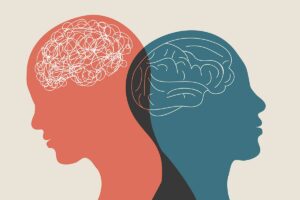Are you struggling with both a mental health disorder and substance abuse issues? If so, know that you’re not alone. It’s common for individuals to experience dual diagnosis or co-occurring disorders. But the good news is that there are various types of therapies available to help manage these conditions. In this blog post, we’ll explore some of the most effective therapy options for those living with dual diagnosis and how they can improve your quality of life.
Contents
What is Dual Diagnosis?

Dual diagnosis, also known as co-occurring disorders, is a term for when someone experiences a mental illness and a substance use disorder simultaneously. It can be difficult to manage both conditions at the same time, but there are treatment options available that can help.
Some of the treatment methods for dual diagnosis include medications, psychotherapy, cognitive-behavioral therapy (CBT), and lifestyle changes.
The Different Types of Therapy For Dual Diagnosis

There are different types of therapy for dual diagnosis, each with its advantages and disadvantages.
Some of these types of therapy are:
Cognitive Behavioral Therapy
One of the most common types of therapy for dual diagnosis is cognitive-behavioral therapy (CBT). This type of therapy focuses on identifying, understanding, and changing negative thinking patterns and behaviors. It also helps individuals learn strategies to better manage their thoughts and feelings associated with both mental health disorders and substance use disorders.
The techniques of this type of therapy include challenging negative thoughts, problem-solving, and thought restructuring. CBT is particularly effective for those with dual diagnosis.
Family Therapy
Another type of therapy for dual diagnosis is family therapy. This type of therapy helps families address the impact that both mental health disorders and substance use disorders have on the family. It also seeks to strengthen relationships and encourages healthy communication within the family.
Family therapy helps families develop problem-solving skills and better understand how to support one another. This type of therapy can be particularly beneficial for those with dual diagnosis as it helps them create a safe and supportive environment in which they can heal and grow.
Dialectical Behavioral Therapy
Another type of treatment option for those with dual diagnosis is dialectical behavioral therapy (DBT). This type of therapy focuses on teaching individuals how to manage their emotions, regulate their behaviors, and build relationships.
The main goal of DBT is to help those with dual diagnosis learn new coping skills and increase their self-awareness. It also emphasizes mindfulness techniques such as deep breathing and meditation. DBT is especially effective for those with dual diagnosis, as it can help them better manage their thoughts and behaviors.
Acceptance and Commitment Therapy
Acceptance and commitment therapy (ACT) is another type of therapy for dual diagnosis. This type of therapy focuses on helping individuals become more aware of their thoughts, feelings, and behavior patterns. The goal is to help them find healthier ways to manage their mental health disorder and substance use disorder.
The techniques of this type of therapy include encouraging individuals to commit to healthier values, accepting difficult emotions and thoughts, and creating a plan for achieving goals. ACT can be especially beneficial for those with dual diagnosis as it helps them create long-term positive change in their life.
Humanistic Therapy
Another type of therapy for dual diagnosis is humanistic therapy. This type of therapy focuses on helping individuals find fulfillment and understanding by exploring their thoughts, feelings, and behaviors. It also encourages individuals to develop a sense of self-worth, purpose, and meaning in life.
The working of this type of therapy includes self-reflection, self-acceptance, and focusing on the present moment. Humanistic therapy is especially beneficial for those with dual diagnosis because it can help them better understand their thoughts and feelings associated with both the mental health disorder and substance use disorder.
Holistic Therapy
An additional type of therapy for dual diagnosis is holistic therapy. This type of therapy focuses on treating the whole person and taking into account the physical, mental, emotional, and spiritual aspects of health. The techniques used in this type of therapy include nutritional counseling, exercise, mindfulness practices such as yoga and meditation, and other alternative therapies.
Some of the other techniques of this type of therapy include creative arts therapies, expressive writing, and animal-assisted therapy. Holistic therapy is especially beneficial for those with dual diagnosis as it can help them reconnect with their bodies and build a stronger sense of self.
Psychodynamic Therapy
Another type of therapy often used for dual diagnosis is psychodynamic therapy. This form of treatment focuses on the connection between thoughts and behaviors, which can be useful in uncovering deeper issues at play that may have led to substance abuse or other mental health struggles.
Psychodynamic therapy encourages a person to talk freely about their experiences and feelings and to resolve conflicts that may be causing psychological distress. The therapist will help the patient explore past relationships and experiences to gain insight into how they may have contributed to current struggles.
Pros and Cons of Types of Therapy For Dual Diagnosis
There are many different types of therapy available for dual diagnosis, and each has its pros and cons. It is important to consider these pros and cons before deciding which type of therapy is right for you or your loved one. Doing so can help ensure that the treatment plan chosen will be effective and successful.
Pros of Dual Diagnosis Therapy

One of the main benefits of dual diagnosis therapy is that it can help individual scans. Here are some of the most common types of therapy for dual diagnosis:
- Makes Recovery Possible: Treatment for dual diagnosis usually involves a combination of therapies that can help individuals learn how to better manage their thoughts, feelings, and behaviors. This can lead to improved mental health, increased physical well-being, and ultimately a successful recovery from both the substance use disorder and the mental health disorder.
- Helps Identify Triggers: Dual diagnosis therapy can also help individuals identify and manage triggers that lead to substance use or mental health symptoms. This can be beneficial as it can help reduce the risk of relapse or a worsening of mental health symptoms.
- Encourages Healthy Coping Skills: Another benefit of dual diagnosis therapy is that it encourages individuals to develop healthier coping skills for managing their mental health disorder and substance use disorder. This can help them find more effective and sustainable ways to manage their symptoms in the long term.
The Cons of Dual Diagnosis Therapy
As with any type of therapy, there are also some potential drawbacks to dual diagnosis treatment.
- Long Treatment Process: Due to the complexity of treating both a mental health disorder and a substance use disorder, treatment for dual diagnosis can be lengthy. This can make it difficult to stay motivated throughout the process.
- Expense: Another potential drawback is that dual diagnosis therapy is often expensive. Depending on the individual’s insurance coverage, this may not be an option for everyone.
- Difficulty With Self-Advocacy: Additionally, individuals with dual diagnosis may have difficulty advocating for themselves and their needs in treatment. This can be challenging as they may not feel comfortable speaking up or asking questions.
What to Expect from Dual Diagnosis Therapy?

When it comes to dual diagnosis therapy, there are a few things you can expect.
- First and foremost, you can expect to receive comprehensive care. This means that your therapist will take into account both your mental health diagnosis and your substance use disorder when developing a treatment plan.
- In addition, you can expect your therapist to provide support and guidance as you work toward recovery.
- Another thing to expect from dual diagnosis therapy is that it will be individualized. This means that your therapist will tailor the treatment plan to meet your specific needs. They will also work with you to identify any triggers or stressors that may contribute to your substance use disorder.
- Finally, you can expect to be treated with respect and compassion by your therapist. They understand the challenges you are facing and will provide you with the support you need to recover.
How to Choose the Right Therapist for You?
There are many different types of therapists out there, so how do you know which one is right for you? Here are a few things to consider when choosing a therapist:
- What type of training does the therapist have? Make sure they have experience treating dual-diagnosis patients.
- How does the therapist make you feel? Do they make you feel comfortable and safe?
- Is the therapist a good fit for your personality? Do they understand your unique needs?
- Do they have a good understanding of dual diagnosis and the various treatment options available?
- Are they up to date on the latest research and developments in dual diagnosis treatment?
Take your time in choosing a therapist, and don’t be afraid to interview multiple therapists before making your decision. The right therapist for you is out there, and with a little bit of effort, you’ll find them.
Conclusion
As you can see, several different types of therapy can be used to treat dual diagnosis. Each type has its benefits and drawbacks, so it is important to take the time to research each one before making a decision. Ultimately, the goal is to find an approach that works best for you and your specific situation. With the right therapies in place, it is possible to successfully manage both mental health issues and substance abuse disorders.
There are also several things to consider when choosing a therapist for dual diagnosis treatment. Take the time to find someone who is experienced and knowledgeable about dual diagnosis and will work with you to develop an individualized treatment plan that meets your needs.
For more information, please contact MantraCare. Addiction is a chronic and often relapsing disorder characterized by compulsive drug-seeking and use despite harmful consequences. If you have any queries regarding Online Addiction Counseling experienced therapists at MantraCare can help: Book a trial Online therapy session


